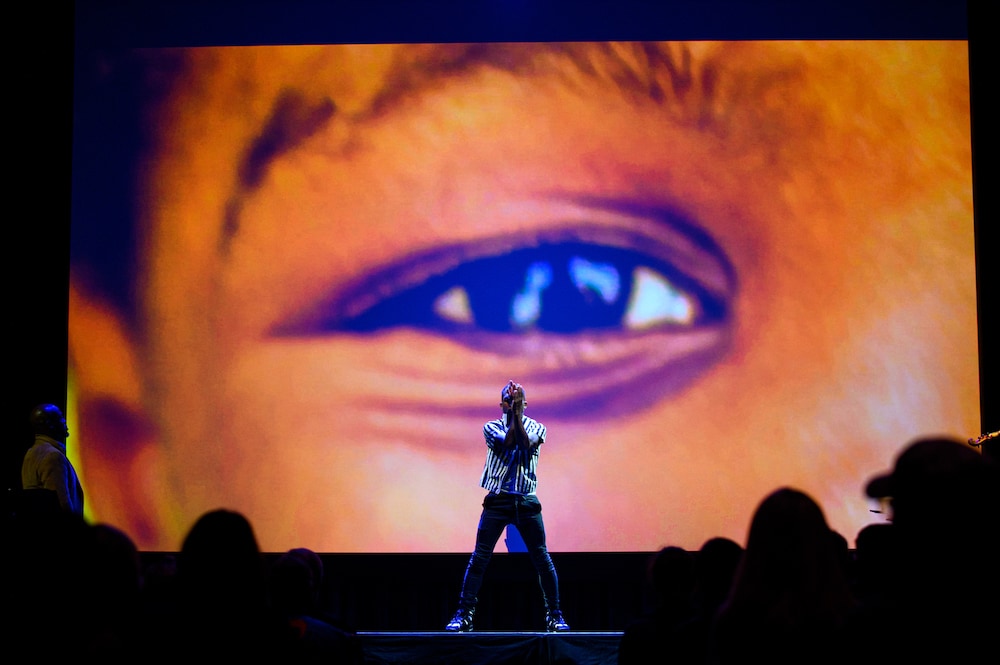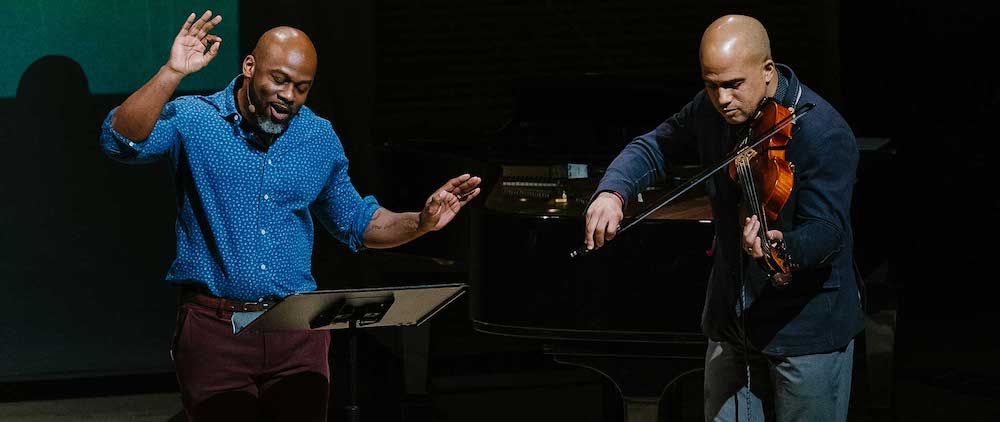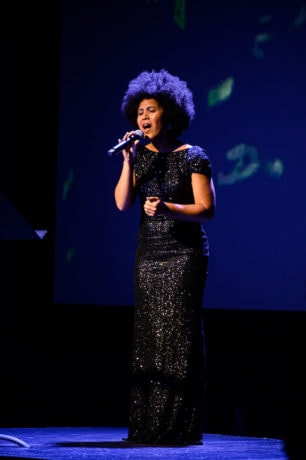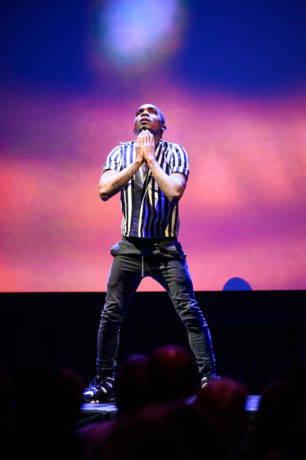“How does a black boy become an American?” asks spoken word artist Marc Bamuthi Joseph. “How does he learn his role to play?”
For Joseph the question is personal and visceral. In The Just and the Blind—which was given a moving performance September 9, 2019, during The REACH Opening Festival—he speaks in powerful autobiographical poetry as the father of a teenage boy. Bewailing “the black boy’s curse” of racial profiling, he refuses to let his vulnerable son “be seen as a monster in the dark.”

Local theatergoers will recall Marc Bamuthi Joseph’s autobiographical Word Becomes Flesh, which Theater Alliance staged as a choreopoem for five actors (in a production that received five Helen Hayes Awards). Word Becomes Flesh told of an unnamed young black man who as a boy was abandoned by his father and who now is about to become himself the father of a son. He does not know how to do it or be that.
The Just and the Blind feels like chapter two. In it, Joseph wrestles with how to spare his 16-year-old son from the carceral fate of “one in four black men [who] are system-involved”—a statistical probability that, Joseph notes, is “like one in three women are victims of sexual assault.”
There is a heartbreaking refrain:
Get home to me, son.

At one telling point Joseph, who sees himself in his son, also sees himself in the three young black men his son’s age who approach him alone on the street. He feels a threat, like “a grown man afraid of the shadow of his youth.” He thinks about crossing the street. “We have so much self-hate that when we see ourselves we are afraid,” he says. “They fit the profile like I did…. I’m most afraid of what I most know.”

In a series of multimedia vignettes, The Just and the Blind opens up the core story of Joseph and his son—musically, choreographically, and cinematically—with three other artists on stage and several off. Joseph’s longtime collaborator, composer-violinist Daniel Bernard Roumain, performed original compositions at the piano and on electronic violin that were in deep harmonic conversation with Joseph’s spoken words. Drew Dollaz, who pioneered “flex” street dance, interpreted Joseph’s text with his own poetry-in-motion of believe-it-or-not twisted limbs and contortions, including a passage in toe shoes. And DC-based vocalist and songwriter Cecily in sparkling black gown brought her shimmering soprano to two of Roumain’s compositions, one based on Dr. King’s “Letter from a Birmingham Jail.”
Among the talents offstage were Director Michael John Garcés, Projection Designer David Szlasa, Animator Xia Gordon, Photographer Brittsense, and Investigative Journalist Lisa Armstrong (whose recordings of phone interviews with juveniles in reform school and others sentenced to life became a chilling part of the storytelling).
As black-and-white documentary footage from civil rights protests, police crackdowns, and freedom marches played on screen in the background in between color stills of fathers and children, the work as a whole took on an urgency and eloquence above and beyond the sum of its profound parts:
We have a constitutional right to literacy, a right to language, and a right to love.
The Just and the Blind was originally commissioned by Carnegie Hall, where it was performed March 5, 2019. Joseph, besides being an acclaimed spoken word artist, is vice president and artistic director of social impact at The Kennedy Center—which doubtless made The Just and the Blind a perfect programming choice to inaugurate The REACH.

In a talkback Joseph spoke of being influenced by Paulo Freire’s advocacy of critical pedagogy—the idea that knowledge is never politically neutral and that teaching is inherently a political act. Accordingly, Joseph and his collaborators intend to turn film shorts based on The Just and the Blind into teaching moments between fathers and sons who have been separated by the prison system. One of those shorts, Fear, closed the program (see trailer below).
Running Time: 65 minutes, with no intermission, plus Q and A and a six-minute film adaptation of the text, Fear.
The Just and the Blind was performed September 9, 2019, in Studio K of The REACH as part of The REACH Opening Festival, which runs through 22, 2019, at The John F. Kennedy Center for the Performing Arts, 2700 F Street, NW Washington, DC. The complete schedule is here. Free timed passes are available at the box office, by calling (202) 467-4600, or online.
The REACH Opening Festival at The Kennedy Center: How Not to Be Overwhelmed
Marc Bamuthi Joseph performing a portion of The Just and the Blind as a TED Talk:
Official trailer for Fear presented by Sozo Media:
https://youtu.be/7o5PtdgOLCQ





Mr. Stoltenberg, thank you for your excellent piece on “The Just and the Blind.” I just want to point out that the photos are not from the Hopkins Center for the Arts at Dartmouth College but rather from an earlier performance. The Hopkins Center will present the work in January 2020, I’m happy to report. Details: https://hop.dartmouth.edu/events/just-and-blind
Thanks, Rebecca Bailey, for that information. The captioning error has been corrected, and photographs from The Kennedy Center performance September 9, 2019, have been swapped in. The Dartmouth audience is in for an important and wonderful performance!